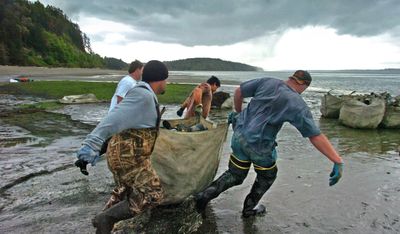Geoduck farming faces challenge
Pierce County says it may be harmful

TACOMA – Raising geoducks may endanger inland marine life and tidelands, Pierce County planners say, a finding that could likely complicate the county’s permit process for farming the ugly but lucrative giant clams.
Highlights of the decision were provided in an e-mail Wednesday to County Council member Terry Lee, who had inquired about the status of a permit application. The News Tribune found the correspondence Thursday during a review of geoduck (GOO’-ee-duck) permit records.
Kathleen Larrabee, a county Planning and Land Services Department supervisor who drafted the decision, told the newspaper that notices were sent within the past week to two permit applicants. One, Taylor Shellfish Farms, the West Coast’s largest geoduck grower, is fighting efforts to close the harvest at its geoduck farm on Case Inlet.
Similar letters probably will be sent to six other permit applicants later, Larrabee said.
“If that applies to one geoduck farm, it has to apply to each geoduck farm,” she said.
Growers may then drop their applications or modify their plans, issue an environmental report on how they would deal with the planners’ concerns or offer scientific evidence to dispute the county’s assessment.
“This shows a lot of wisdom on Pierce County’s part despite the legal challenge the industry has promised,” said Laura Hendricks, of the Gig Harbor area, a spokeswoman for the Coalition to Protect Puget Sound Habitat.
For more than a year, the coalition has sought a county requirement for a full environmental review before any new geoduck farms are authorized. The group contends that intensive shellfish farming harms shorelines, fish and wildlife.
“We are pleased to see the process moving forward and the issues getting more defined,” Taylor spokesman Bill Dewey said, saying that his company will offer scientific research to meet the county’s concerns.
“There’s actually been a fair amount of work done,” Dewey said. “We’ll just have to wait and see how it comes out.”
A dispute over Taylor’s geoduck farm northwest of Joemma Beach State Park resumes Monday in Thurston County Superior Court in Olympia. The coalition has asked a judge to overturn a Pierce County decision that allows Taylor to harvest clams despite expiration of a permit.
Most geoduck farming operations cover beaches with thousands of plastic tubes and yards of netting to protect baby clams from predators.
County officials found three potential problems – possible contamination of the wild geoduck gene pool, a potential for release of buried toxins when the big bivalves are harvested and a threat of damage to other organisms along the beach.
Scientific findings on the threat to other marine life seemed inconsistent, Larrabee said. “There are arguments both ways,” she said. “We want to, if anything, err on the side of caution.”